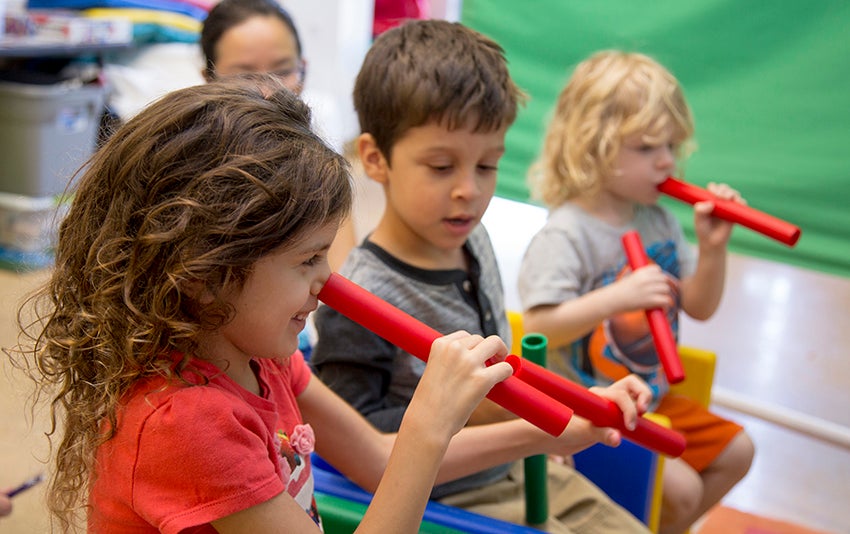Forging a Path Forward: Supporting PreK-12 Students Post COVID-19

Deeply concerned by the profound impact the COVID-19 pandemic is having on a generation of Texas children, UT College of Education Dean Charles Martinez and Texas 2036 CEO Margaret Spellings convened a half-day summit of researchers and education stakeholders in March 2021 to discuss the immediate and longer-term resources needed to ensure that Texas students recover and thrive in a post-COVID world.
Joined Texas Education Agency Commissioner Mike Morath, participants identified the need to act quickly and equitably as the pandemic has disproportionally impacted already vulnerable populations as evidenced by the 2020-2021 STAAR test scores.
Charged with the urgent mission of rethinking every aspect of the Texas learning system — students, their families and caregivers, and the entire school community, including teachers and administrators — the group leveraged its collective expertise to develop the following recommendations.
The longstanding gaps in academic achievement have been made worse by the pandemic. Educators must implement intensified and accelerated instruction in math and reading for all students to close the gaps in academic achievement.
- Give teachers the instructional materials, professional development, and additional support needed to provide challenging instruction in both math and reading
- Institute interventions that define the most critical instructional content priorities and benchmarks for grade-level success and focus instruction accordingly
- Use extended learning time and high-dosage tutoring tied to classroom content to keep all students on track to state-level proficiency
Many students faced tremendous adversity during the pandemic, including struggles with learning, illness and death, long-term stress, declining family resources, and increased isolation. Students who were already facing adversity will struggle in the coming years. The pandemic’s effects risk widening the already existing gaps in academic achievement and there is a greater need for differentiated instruction.
Students will be more successful when their social and emotional needs are met and they have a feeling of belonging. Regular curriculum and wellness assessments provide both students and teachers with the feedback they need to improve teaching, learning, and promote well-being.
If we don’t [find a path forward], the moral consequences to this generation of Texas and American kids are dire.
TEA Commissioner Mike Morath
Teachers need to be empowered to use these assessments to understand what their students need before a cycle of disengagement or underperformance can form so they can deliver just-in-time instruction and help students achieve and maintain grade-level performance.
- Invest in the development of assessment tools aligned to instructional materials that can identify missing academic skills or disparities in social-emotional supports to keep students at or above grade level
- Empowering teachers to use formative assessments of both academic content and student well-being to inform planning, instruction, and interventions
Students are motivated to learn when curriculum and instruction are inclusive of their cultural backgrounds and when they can see themselves and their communities’ strengths reflected, validated, and celebrated. Students with disabilities, whose social and emotional losses are heightened, need targeted, specialized strategies.
- Provide principals, teachers, and tutors with professional development and ongoing support to implement interventions with academic rigor, culturally responsive pedagogy, and social and emotional learning (SEL) practices
- Support equitable and inclusive classroom environments that recognize students’ diverse cultures, abilities, and strengths
- Provide principals, teachers, and tutors with professional development and ongoing support to integrate interventions that attend to the health and well-being of the entire campus community
- Support system leaders by aligning intervention and programmatic efforts so they can build on local expertise and lived experience from teachers, school leaders, families, and students
Groundbreaking research exists within Texas universities, institutes, and organizations that can inform teaching practices, however; the pace at which research makes its way into practice is too slow.
Unfortunately, no mechanism currently exists for enabling researchers and educators to evaluate and share local educational innovations across the state. The RP3 would provide a statewide mechanism to learn from one another through the implementation, evaluation, and adaptation of evidence-based practice across Texas.
- Harness the resources and assets that already exist among education partners in the state.
- Provide an efficient mechanism to foster collaboration with communities, practitioners, researchers, and policymakers.
- Identify, co-develop, evaluate, adapt, and scale evidence-based practices and interventions that support Texas students’ positive development and academic achievement, particularly those who have been disproportionately impacted by the pandemic.
- Focus efforts on the key problems of accelerated learning and student well-being in math and reading.
- Inform future education policy decisions through real-time data and Texas classroom-based research studies.
This holistic and strategic work and approach have never been more important as we emerge from the pandemic and work to achieve equity in education.
Education leaders Texas 2036 CEO Margaret Spellings, Texas Association of School Boards Executive Director James B. Crow, Texas Association of School Administrators Executive Director Kevin Brown, and College of Education Dean Charles R. Martinez, Jr. penned a letter to encourage the support of PreK-12 students post-COVID 19.
Pre-pandemic
Extensive discussions about the achievement gap in education.
March 2020
Texas Schools close due to the pandemic.
Spring and Fall 2020
Educators at all levels grow alarmed by how the shutdown is disproportionately affecting students of color.
Winter 2020
The first “From the Front Lines” meeting is held.
March 2021
Dean Martinez and Texas leaders convene a summit of researchers, educators, and education leaders tasked with rethinking education.
The Goal
Create a Research-Practice-Policy Partnership (RP3) that would develop research-based solutions designed to close the education gap.
Looking Ahead
Obtain funding from the Federal CARES Act and the Texas Legislature to create the RP3.

